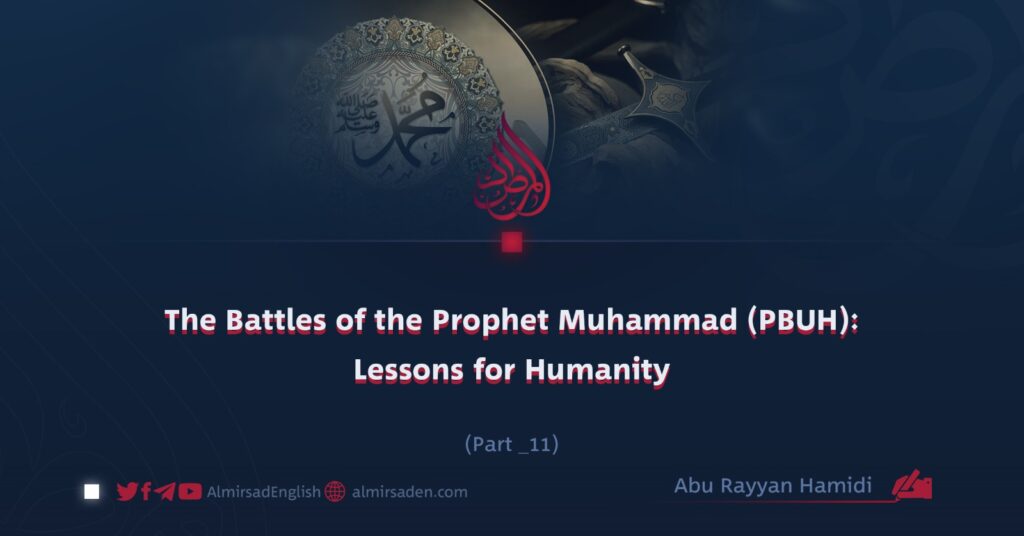Part 11
Abu Rayyan Hamidi
The General Assault
Following the loss of three of their most formidable commanders, the polytheists were overwhelmed with grief and rage. Driven by a thirst for vengeance and the rekindled fire of envy, they prepared for an all-out assault.
After the conclusion of the duels and the slaying of their champions, Abu Jahl, one of their most prominent leaders, addressed his army in fury, declaring:
“They have used trickery. By Allah, we shall not relent until we have them bound in chains!”
He then ordered a general attack, and the battle erupted in full. The Muslim ranks stood firm, their tongues moist with the powerful declaration, “Ahad, Ahad”. As the enemy forces advanced, the Muslims responded with volleys of arrows and fearless hand-to-hand combat. The polytheists suffered severe losses.
The Supplication of the Prophet (PBUH)
With the ranks arranged and commanders appointed, the Prophet Muhammad (PBUH), the noble leader of the army, withdrew to his tent. There, he turned wholeheartedly to Allah, the Owner of victory. With tearful eyes and a trembling heart, he raised his blessed hands in heartfelt supplication:
“اللهم أنجز لي ما وعدتني، اللهم إن تهلک هذه العصابة من أهل الإسلام فلا تعبد في الأرض أبدا”
“O Allah, fulfill what You have promised me. O Allah, if this small band of Muslims is destroyed today, You will not be worshipped on Earth again.”
He continued pleading with such intensity that his cloak slipped from his shoulders. Abu Bakr (RA) gently placed it back upon him and said:
“Enough, O Messenger of Allah. Your Lord will surely fulfill His promise.”
Shortly thereafter, the Prophet (PBUH) appeared to briefly doze off as divine revelation descended. Upon waking, he turned to Abu Bakr with glad tidings:
“Rejoice, O Abu Bakr! Jibril has arrived, holding the reins of his horse. A cloud of dust is rising before him.
Emerging from his tent, the Prophet (PBUH) recited the powerful verse:
“Their multitude will be put to flight, and they will turn their backs in retreat.” (Qur’an 54:45)
With fervor, he grabbed a handful of dust and cast it toward the enemy’s ranks, proclaiming:
“May their faces be disfigured!”
Miraculously, the dust reached the eyes and faces of every disbeliever. Allah affirmed this act in the Qur’an:
“و ما رمیت إذ رمیت ولکن الله رمی”
“It was not you who threw when you threw, but it was Allah who threw.” (Qur’an 8:17)
The Counterattack
Now present on the battlefield himself, the Prophet Muhammad (PBUH) commanded the believers to launch a counteroffensive. He urged his companions:
“Advance!”
To uplift their spirits and fortify their resolve, he proclaimed:
“والذي نفس محمد بیده، لا یقاتلهم الیوم رجل فقتل صابرا محتسبا مقبلا غیر مدبر، إلا أدخله الله الجنة”
“By the One in Whose Hand is the soul of Muhammad, whoever fights them today with patience, seeking reward, facing the enemy and not turning his back, Allah will surely admit him into Paradise.”
The companions, already ablaze with faith and courage, were further invigorated by his words. Like lions, they surged into the disordered ranks of the polytheists, scattering them and dealing crushing blows.
Their morale soared even higher upon seeing their beloved leader, the Prophet (PBUH), clad in armor, walking among them and repeating the verse:
“Their multitude will be put to flight, and they will turn their backs in retreat.” (Qur’an 54:45)
The Descent of the Angels
The Battle of Badr holds a unique distinction in Islamic history. It is the only battle in which Allah sent angels to directly assist the Muslim army.
Ibn Saʿd narrates from ʿIkrimah that during the battle, they witnessed heads and limbs of the polytheists severed, yet they could not discern who had struck the blows. The intervention was both divine and miraculous.
The wisdom behind this angelic reinforcement, and the reason for their great number, will, in sha’ Allah, be explored further in future reflections on the lessons of Badr.
The Qur’an confirms this divine support in multiple verses:
“إِذْ يُوحِي رَبُّكَ إِلَى الْمَلَائِكَةِ أَنِّي مَعَكُمْ فَثَبِّتُوا الَّذِينَ آمَنُوا سَأُلْقِي فِي قُلُوبِ الَّذِينَ كَفَرُوا الرُّعْبَ فَاضْرِبُوا فَوْقَ الْأَعْنَاقِ وَاضْرِبُوا مِنْهُمْ كُلَّ بَنَانٍ”
“[Remember] when your Lord revealed to the angels: ‘Indeed, I am with you, so strengthen those who have believed. I will cast terror into the hearts of those who disbelieve. So strike above their necks and strike from them every fingertip.'”(Qur’an 8:12)
“إِذْ تَقُولُ لِلْمُؤْمِنِينَ أَلَنْ يَكْفِيَكُمْ أَنْ يُمِدَّكُمْ رَبُّكُمْ بِثَلَاثَةِ آلَافٍ مِنَ الْمَلَائِكَةِ مُنْزَلِينَ”
“[Remember] when you said to the believers, ‘Is it not sufficient for you that your Lord should reinforce you with three thousand angels sent down?'” (Qur’an 3:124)
“بَلَى إِنْ تَصْبِرُوا وَتَتَّقُوا وَيَأْتُوكُمْ مِنْ فَوْرِهِمْ هَذَا يُمْدِدْكُمْ رَبُّكُمْ بِخَمْسَةِ آلَافٍ مِنَ الْمَلَائِكَةِ مُسَوِّمِينَ”
“Yes, if you remain patient and conscious of Allah and the enemy comes upon you all at once, your Lord will reinforce you with five thousand angels, marked and ready.” (Qur’an 3:125)
The hadith literature further affirms this divine intervention. Ibn Abbas (RA) narrated:
On the day of Badr, a Companion was pursuing a polytheist. Suddenly, he heard the sound of a whip above him and the voice of a rider saying:
“Advance, O Hayzum!” (Hayzum being the name of the angel’s horse).
When he looked again, he found the polytheist lying face down, bearing a gash across his nose and face as though struck by an unseen whip.
When this incident was relayed to the Prophet Muhammad (PBUH), he said:
“You have spoken the truth. That was aid from the third heaven.” (Sahih Muslim)
This momentous battle, filled with divine signs, moral clarity, and unwavering faith, offers timeless lessons for believers in every era. It was not merely a clash between two armies, but a decisive turning point in human history that highlighted the power of faith, the importance of supplication, and the reality of divine support.
